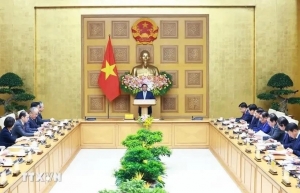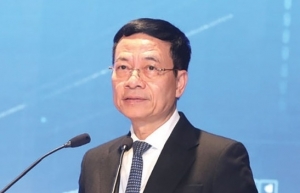Team Europe approach can boost Vietnam’s progress
What are some sectors attracting investment from European funds and companies?
The EU is a major source of foreign direct investment for Vietnam, with European companies investing in various sectors beyond agriculture to support sustainable development. In Vietnam, the EU is also active in manufacturing, renewable energy, services, digital sectors, and the pharmaceutical industry.
 |
| Myriam Ferran, deputy director-general for International Partnerships at the European Commission |
More broadly, the green and digital transitions are the two overarching strategic areas of the EU’s engagement with partner countries. Investments focused on these objectives enable the EU to promote sustainable and fair social and environmental norms, transfer technology, foster a skilled workforce, and, through an increased European private sector presence in Vietnam, create local value and support jobs and growth for of Vietnamese citizens.
Energy is a priority sector in our cooperation with Vietnam, particularly following the adoption of the Just Energy Transition Partnership’s political declaration in 2022. This partnership aims to mobilise €15.5 billion ($17.3 billion) to support Vietnam’s sustainable energy transition, with a substantial portion coming from the private sector.
The EU, alongside the European Investment Bank and member states, will contribute over €2.8 billion ($3.1 billion) in grants and loans to the partnership, significantly boosting Vietnam’s climate change mitigation efforts in the energy sector. This demonstrates the international community’s commitment to supporting Vietnam in achieving net-zero emissions by 2050, in line with its targets.
The EU is boosting the implementation of its Global Gateway strategy in Vietnam. Could you explain this strategy and how it promotes sustainable development in the country?
Global Gateway is the European Union’s investment strategy aimed at promoting smart, clean, and secure connections in digital, energy, and transport sectors, while also strengthening health, education, and research systems globally. In Vietnam, the Global Gateway seeks to mobilise quality investments in smart infrastructure to connect the country to global markets, accelerating its integration into ASEAN. This initiative also benefits the local population by building green and digital skills, helping Vietnam unlock its full potential to meet future challenges and opportunities.
By investing in sustainable energy transitions, knowledge transfer, and technology, the strategy contributes to a low-carbon circular economy, enhances competitiveness, and creates decent, inclusive jobs.
Global Gateway aligns with international values, norms, and standards, including the UN’s Sustainable Development Goals, the Paris Agreement on climate change, and the Kunming-Montreal Global Biodiversity Framework. Together with our partners, we design projects that are inclusive and transparent, adhering to the highest environmental, financial, social, and labour standards.
Delivered through the ‘Team Europe’ approach, Global Gateway brings together the EU, its member states, and their financial and development institutions to create a transformational impact on the ground.
One example in Vietnam is the Bac Ai pumped hydro storage project, which supports the construction of a four-unit system with a total capacity of 1,200MW. This project helps Vietnam meet its carbon neutrality commitments and phase out coal for energy generation, promoting a sustainable and prosperous future for local communities.
How can European companies support Vietnamese businesses in accelerating sustainable development?
European companies can play a crucial role in accelerating sustainable development in Vietnam by bringing in investments, expertise, and skills development.
Through the Global Gateway, they can share EU know-how by transferring green technologies – such as renewable energy, energy-efficient equipment, and sustainable agricultural practices – while providing training and capacity building to enhance local expertise and investing in green projects.
Additionally, European firms can collaborate on research and development, promote international environmental standards, and provide access to green financing. By integrating Vietnamese companies into sustainable supply chains and advocating for stronger environmental policies, European companies can make a significant contribution to Vietnam’s green transition.
 | Green economy, digital economy breakthrough of Vietnam-China ties: PM Prime Minister Pham Minh Chinh on May 14 expressed his belief that economic-investment-trade cooperation, especially in green economy and digital economy, will be a driver and a breakthrough of the Vietnam-China relationship. |
 | South Korean M&A investment leans towards green and digital transitions Energy and infrastructure, as well as tech-related businesses, are emerging as the main sectors for South Korean merger and acquisition (M&A) investment in Vietnam. Cha Sung Wook, deputy director of the Korea Trade-Investment Promotion Agency’s Hanoi Office, talked to VIR ’s Bich Thuy about the current interest in the domestic market. |
 | The 2024 vision for digital application, digital productivity, and digital growth Vietnam’s digital technology industry has made encouraging steps of development and maturity over the years. |
What the stars mean:
★ Poor ★ ★ Promising ★★★ Good ★★★★ Very good ★★★★★ Exceptional
Related Contents
Latest News
More News
- Citi economists project robust Vietnam economic growth in 2026 (February 14, 2026 | 18:00)
- Sustaining high growth must be balanced in stable manner (February 14, 2026 | 09:00)
- From 5G to 6G: how AI is shaping Vietnam’s path to digital leadership (February 13, 2026 | 10:59)
- Cooperation must align with Vietnam’s long-term ambitions (February 13, 2026 | 09:00)
- Need-to-know aspects ahead of AI law (February 13, 2026 | 08:00)
- Legalities to early operations for Vietnam’s IFC (February 11, 2026 | 12:17)
- Foreign-language trademarks gain traction in Vietnam (February 06, 2026 | 09:26)
- Offshore structuring and the Singapore holding route (February 02, 2026 | 10:39)
- Vietnam enters new development era: Russian scholar (January 25, 2026 | 10:08)
- 14th National Party Congress marks new era, expands Vietnam’s global role: Australian scholar (January 25, 2026 | 09:54)

 Tag:
Tag:



















 Mobile Version
Mobile Version